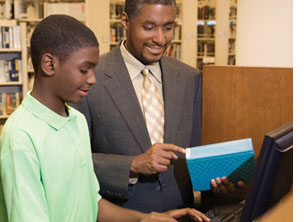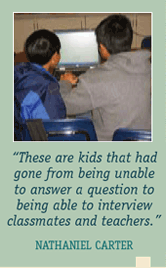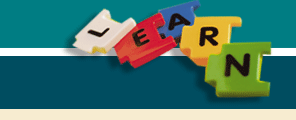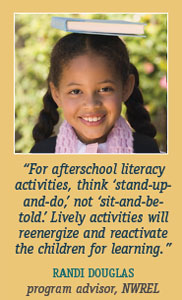 |
|
 |
 |
|
||||
 |
What the Research Says About Talking and Playing in Literacy Instruction How do you balance the restless energy of children who have already spent 7 hours trying to “be good” in school with expectations that their participation in afterschool will lead to higher test scores? If literacy is a component of your afterschool program, you will be interested in the Afterschool Training Toolkit for literacy, an online staff development tool created by the National Partnership for Quality Afterschool Learning. Staff at Northwest Regional Laboratory (NWREL), a partner in the National Partnership, developed the materials in the literacy toolkit. They have also supplemented the toolkit with a series of staff development tools that are available online. The staff development resources and the research on which they
are based make it clear that literacy in afterschool is not simply
an extension of the school day. Promising practices in literacy
include book discussion groups and story dramatizations. Research
has shown that discussing and enacting stories can improve student
literacy. These types of activities can also lay the foundation
for continuous improvement by creating a greater interest in
reading.1 See Recommended Resources (above) for additional information. * Winner, E., & Hetland, L. (2000, Fall/Winter). The arts and academic achievement: What the evidence shows. Executive summary. The Journal of Aesthetic Education, 34. Retrieved February 22, 2007, from http://www.pz.harvard.edu/Research/Reap/REAPExecSum.htm; Spielberger, J., & Halpern, R. (with Pitale, S., Nelson, E., Mello-Temple, S., Ticer-Wurr, L., et al.). (2002). The role of after-school programs in children’s literacy development. Chicago: University of Chicago, Chapin Hall Center for Children. |
|

 |
Sunset Neighborhood Beacon Center, After School Learning Center (ASLC)
|
|
|
 |
Copyright © 2007 by SEDL . This newsletter was produced in whole or in part with funds from the U.S. Department of Education under contract number ED-01-CO-0057/0001. If you are having trouble viewing this newsletter, please view it online. To unsubscribe from this list, please reply to this e-mail and include the word Unsubscribe in the subject line. |
Questions or comments should be directed to: Laura Shankland |




